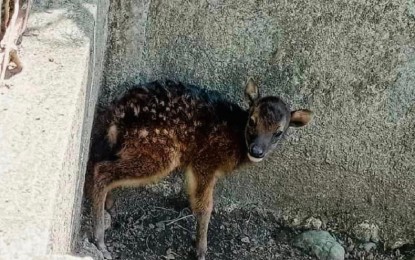
ANIMAL WELFARE. A baby deer is the latest addition inside the Mari-it Wildlife and Conservation Park in Barangay Jayubo, Lambunao. The park encouraged private groups to adopt an animal inside the park to sustain the needs of various species rescued and bred at the facility. (Photo courtesy of Nestor Cabayao/ Jennifer Osorio)
ILOILO CITY – The municipal government of Lambunao, through its tourism office, introduced the “Adopt an Animal” project at Mari-it Wildlife and Conservation Park to sustain the needs of various species rescued and bred at the facility.
The park has in its care seven Visayan tarictic hornbills, 11 Visayan writhed hornbills, 24 Visayan spotted deer, nine Visayan warty pigs, five Visayan leopard cats, four long-tailed macaques, and one Philippine palm civet.
The Visayan tarictic and writhed hornbill, Visayan warty pig and spotted deer have been declared critically endangered and the Visayan leopard cat as vulnerable, based on the Department of Environmental and Natural Resources (DENR) Administrative Order No. 19 issued in 2019.
Tourism officer Jennifer Osorio, in an interview on Wednesday, said interested individuals or groups can choose the species they wish to adopt. Their names will be posted at the cage or part of the facility where their adopted species are being accommodated.
“Hopefully, it’s for a minimum of one year. We will come up with a program to determine their consumption in a month. So for the duration of the adoption, they can visit the animal anytime and bring food,” she said.
The local government spends around PHP30,000 on their food alone every month; each species has specific needs.
For instance, leopard and civet cats need at least one and one-half kilos of dressed chicken daily, while hornbills, other than the variety of fruits, also need white mice or dog food for their protein requirement.
“Their food is calculated,” she added.
Meanwhile, Osorio said they have a new fawn or baby deer borne by one of the spotted deer inside the facility.
“The spotted deer gives birth once a year, with only one fawn. Last year, there was one, and hopefully, we have another one next year,” she said, adding that of the 24, only three were female.
Osorio said they were considering swapping some of the animals for breeding purposes.
She said it is already difficult for them to breed since they are already older and came from the same family.
The hornbills are over five years old, some of the spotted deer are more than 10 years old, while the age range of warty pigs is eight to 15 years.
“We still have to prepare documents since we are also under the DENR,” she said.
The wildlife and conservation in Barangay Jayubo, some 16 kilometers away from the town proper, is now open to the public after its closure on June 12 last year due to the threat of African swine fever.
It is the first conservation, breeding, and rescue park in Panay Island, managed by the local government unit, West Visayas State University-College of Agriculture and Forestry, and the DENR. (PNA)
 The Philippine News Agency is a web-based newswire service of the Philippine government under the supervision of the News and Information Bureau (NIB) of the Presidential Communications Office (PCO).
The Philippine News Agency is a web-based newswire service of the Philippine government under the supervision of the News and Information Bureau (NIB) of the Presidential Communications Office (PCO).